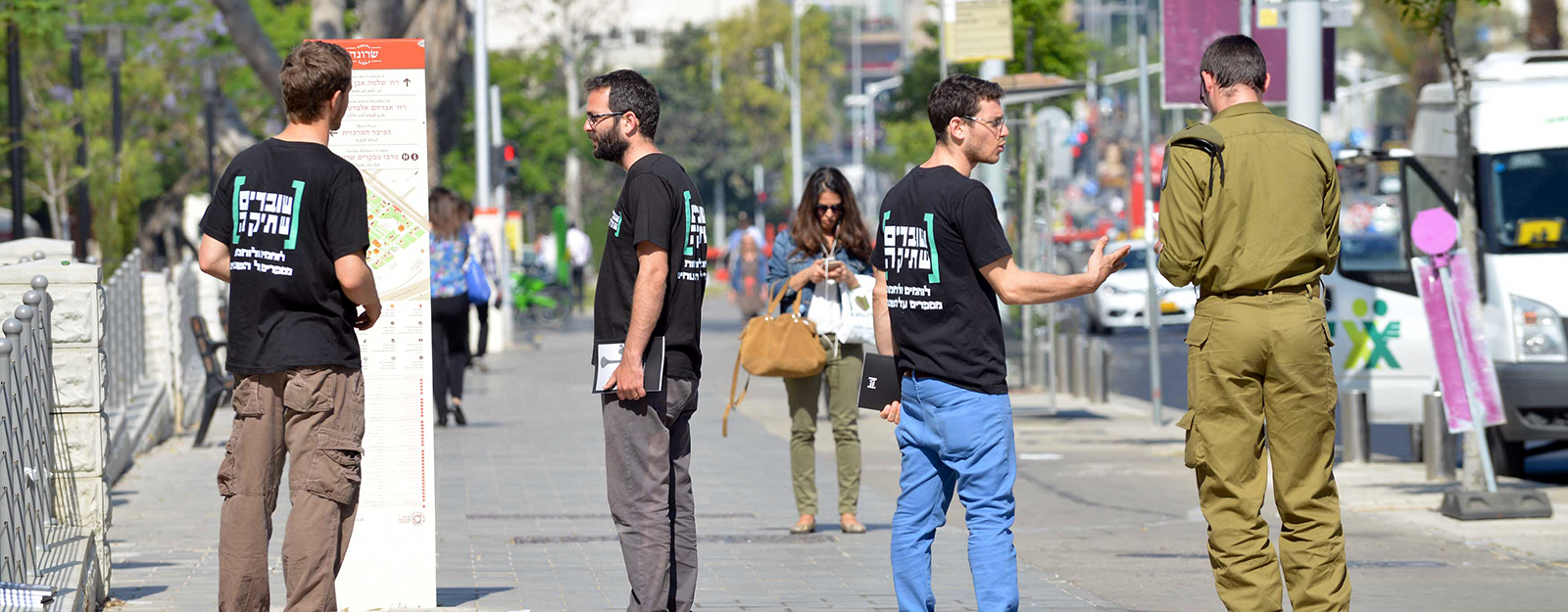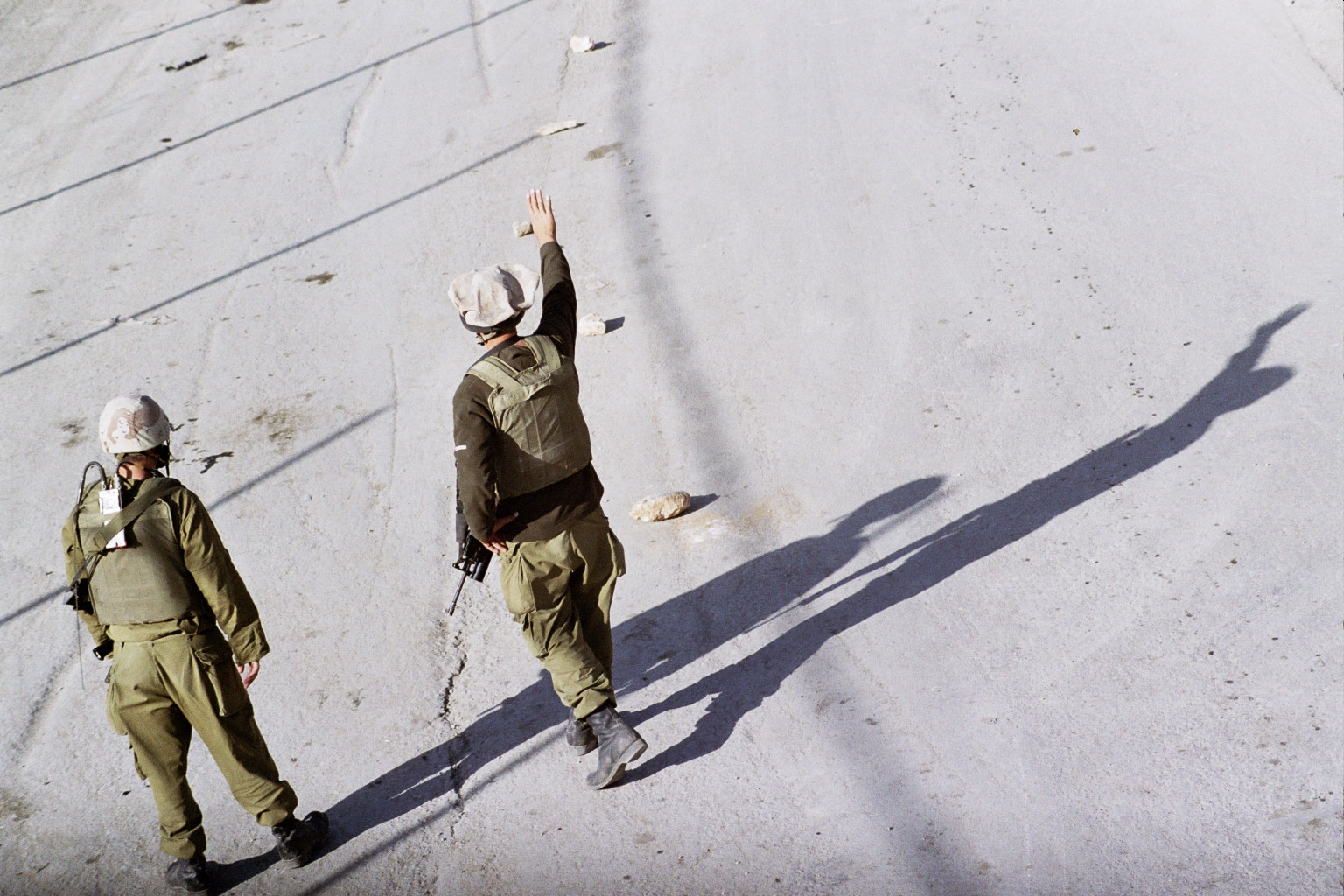I was a squad commander by this point. It was also one of those crazy periods, the same story I told about Hebron, only this time inside Nablus. No static posts. I remember I’d say to the soldiers who were interested, that they should be thankful they weren’t in Hebron. One checkpoint is called Havah 7, Beit Furik, one checkpoint is called Meteg 3, which is at the northern, northeastern exit between Nablus and Ein Bidan, and one that’s called “the valley of the runaways,” which brings back a lot of memories that I hadn’t remembered until now. The valley of the runaways . . . most of the checkpoints there, nothing really happened, because there was a squad commander. Unusual things started happening when there were fewer available squad commanders, and so soldiers started being squad commanders . . . the central checkpoints in Nablus, Hava 5, Hava 7, Hava 6—normally nothing unusual happens there, because they’re open to the media. Those people are always there—Machsom Watch, B’Tselem, you know. But sometimes it’s not clear where the checkpoint is—it’s a moving checkpoint, what’s called a checkpost, or an unestablished checkpoint, which you set up with an APC so you can close off a wide area and prevent Palestinians from exiting there. You always patrol or set up the checkpoint in a different post each time, and no one sees you there, no one knows where you are, it’s abandoned land. When I was there, not too much happened, either. But things could happen there because there’s no real supervision.
Are there things that are part of the procedure, like detaining people, drying them out, confiscating their keys? Are those things you’re familiar with?Okay, yes. Look, at the checkpoint, detaining someone is the right thing to do. I can tell you that today, for all the reasons, detaining someone is preferred, it’s the least terrible thing. A soldier is in a life-threatening situation at a checkpoint. If there’s no order there, then the soldier could die. It’s an issue of life and death, because all of the checkpoints there are very dangerous, you’re very vulnerable when you’re at a checkpoint. You’re a soldier, you’re standing there, and it’s easy to attack you. The moment a checkpoint commander loses control of his checkpoint— people aren’t standing in a straight line, people get too close and wander around the checkpoint freely, then there’s a good chance that someone will come and blow himself up, or shoot the commander and take advantage of the chaos. A checkpoint that’s routinely chaotic, or if the commander of the checkpoint is always disorganized, it’s only a matter of time until a terrorist, especially in a dangerous area like Nablus, will figure this out and attack it. And so the question is, what can the commander do to maintain order at the checkpoint? So he can use physical violence, which works, it certainly works. Cruelty works. If you take a person who’s going crazy and smash him in the head with the butt of your weapon, it works, it’s effective. It’s unethical, and commanders don’t normally do it. And because of that, commanders detain people. It’s a less effective method, it frightens them less, but there it is, it works.
What does it involve?A person who gave you some trouble, who disturbed the peace at the checkpoint, who spoke to you in a certain way . . . you have to keep your authority, you have to keep it so they respect you at the checkpoint. What can you do? It sounds terrible, and it is. That’s the reality of the checkpoint. Everything to say about the checkpoint has already been written and said, whoever’s seen the movie Checkpoint understands it, I think. In the end, you have to have people respect you, and you have to keep order at the checkpoint. So you take that guy who got out of line, those few people who were making trouble for you, and you tie their hands behind their backs and sit them down for ten hours, five hours.
Who decides? The checkpoint commander?The checkpoint commander who’s there. And again, I have to say, that as long as checkpoints exist—and this is an entirely different discussion, if there should or shouldn’t be checkpoints . . . apparently there have to be, because there isn’t much of a choice in certain places, and there are also places where the checkpoints could go. That’s clear to me. And when they’ll be able to evacuate the settlements in general, it’ll be possible to get rid of many checkpoints. But there’s a certain number of checkpoints that’ll still exist. And as long as checkpoints exist, detainment is the most humane way, among all the other ways which are less humane, to keep order at the checkpoint. And what can you do? You also have to protect the lives of the soldiers.
As a checkpoint commander, who tells you that you’re allowed or not allowed to detain someone?That’s during the company commander’s briefing. They told us that it was acceptable to detain people. No one legitimized physical violence.
What other means of punishment or authority are used?In the more extreme cases, they take people to the company. There was, like, a temporary prison camp in the company that we set up, where people could stay for two days. It’s for cases where people really made a lot of trouble. You take them to the jeep, put them in the improvised prison camp we set up, with a tin roof, and mattresses.
Are they prisoners?Yes. Their hands are tied behind their backs, and they sit in the temporary prison camp for a day or so. We give them water, food, but they’re bound there for a day in the company prison camp, and there’s someone who guards them. It’s a kind of tin roof, with a mattress underneath, and surrounded by barbed wire.
What were the criteria to merit a day or two in the temporary prison camp?I don’t remember. It was for people who really caused trouble. Someone you detained, but he kept making trouble, started acting crazy, acting violently, or it was for someone you caught regularly.









 testimonies
testimonies  media & content
media & content 










 We had a kind of temporary prison camp
We had a kind of temporary prison camp 

 terms of use & privacy policy
terms of use & privacy policy